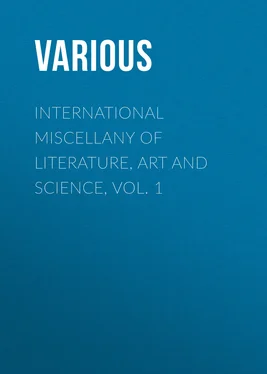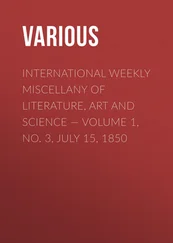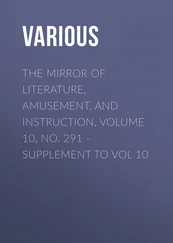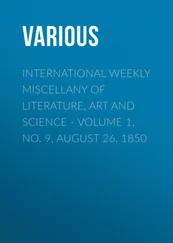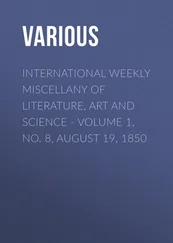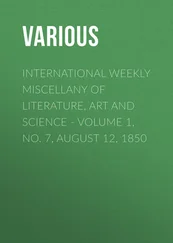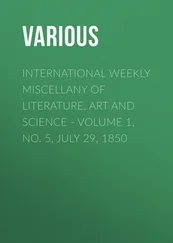Various - International Miscellany of Literature, Art and Science, Vol. 1
Здесь есть возможность читать онлайн «Various - International Miscellany of Literature, Art and Science, Vol. 1» — ознакомительный отрывок электронной книги совершенно бесплатно, а после прочтения отрывка купить полную версию. В некоторых случаях можно слушать аудио, скачать через торрент в формате fb2 и присутствует краткое содержание. Жанр: foreign_antique, periodic, foreign_edu, на английском языке. Описание произведения, (предисловие) а так же отзывы посетителей доступны на портале библиотеки ЛибКат.
- Название:International Miscellany of Literature, Art and Science, Vol. 1
- Автор:
- Жанр:
- Год:неизвестен
- ISBN:нет данных
- Рейтинг книги:3 / 5. Голосов: 1
-
Избранное:Добавить в избранное
- Отзывы:
-
Ваша оценка:
- 60
- 1
- 2
- 3
- 4
- 5
International Miscellany of Literature, Art and Science, Vol. 1: краткое содержание, описание и аннотация
Предлагаем к чтению аннотацию, описание, краткое содержание или предисловие (зависит от того, что написал сам автор книги «International Miscellany of Literature, Art and Science, Vol. 1»). Если вы не нашли необходимую информацию о книге — напишите в комментариях, мы постараемся отыскать её.
International Miscellany of Literature, Art and Science, Vol. 1 — читать онлайн ознакомительный отрывок
Ниже представлен текст книги, разбитый по страницам. Система сохранения места последней прочитанной страницы, позволяет с удобством читать онлайн бесплатно книгу «International Miscellany of Literature, Art and Science, Vol. 1», без необходимости каждый раз заново искать на чём Вы остановились. Поставьте закладку, и сможете в любой момент перейти на страницу, на которой закончили чтение.
Интервал:
Закладка:
He was with Mr. Burton until June, 1840—more than a year. Mr. Burton Appreciated his abilities and would have gladly continued the connection; but Poe was so unsteady of purpose and so unreliable that the actor was never sure when he left the city that his business would be cared for. On one occasion, returning after the regular day of publication, he found the number unfinished, and Poe incapable of duty. He prepared the necessary copy himself, published the magazine, and was proceeding with arrangements with for another month, when he received a letter from his assistant, of which the tone may be inferred from this answer:
"I am sorry you have thought it necessary to send me such a letter. Your troubles have given a morbid tone to your feelings which it is your duty to discourage. I myself have been as severely handled by the world as you can possibly have been, but my sufferings have not tinged my mind with melancholy, nor jaundiced my views of society. You must rouse your energies, and if care assail you, conquer it. I will gladly overlook the past. I hope you will as easily fulfill your pledges for the future. We shall agree very well, thought I cannot permit the magazine to be made a vehicle for that sort of severity which you think is so 'successful with the mob.' I am truly much less anxious about making a monthly 'sensation' than I am upon the point of fairness. You must, my dear sir, get rid of your avowed ill-feelings toward your brother authors. You see I speak plainly; I cannot do otherwise upon such a subject. You say the people love havoc. I think they love justice. I think you yourself would not have written the article on Dawes, in a more healthy state of mind. I am not trammeled by any vulgar consideration of expediency; I would rather lose money than by such undue severity wound the feelings of a kind-hearted and honorable man. And I am satisfied that Dawes has something the true fire in him. I regretted your word-catching spirit. But I wander from my design. I accept your proposition to recommence your interrupted avocations upon the Maga . Let us meet as if we had not exchanged letters. Use more exercise, write when feelings prompt, and be assured of my friendship. You will soon regain a healthy activity of mind, and laugh at your past vagaries."
This letter was kind and judicious. It gives us a glimpse of Poe's theory of criticism, and displays the temper and principles of the literary comedian in an honorable light. Two or three months afterward Burton went out of town to fulfill a professional engagement, leaving material and directions for completing the next number of the magazine in four days. He was absent nearly a fortnight, and on returning he found that his printers in the meanwhile had not received a line of copy; but that Poe had prepared the prospectus of a new monthly, and obtained transcripts of his subscription and account books, to be used in a scheme for supplanting him. He encountered his associate late in the evening at one of his accustomed haunts, and said, "Mr. Poe, I am astonished: Give me my manuscripts so that I can attend to the duties you have so shamefully neglected, and when you are sober we will settle." Poe interrupted him with "Who are you that presume to address me in this manner? Burton, I am— the editor—of the Penn.—Magazine —and you are—hiccup— a fool ." Of course this ended his relations with the "Gentleman's."
In November, 1840, Burton's miscellany was merged in "The Casket," owned by Mr. George R. Graham, and the new series received the name of its proprietor, who encouraged Poe in its editorship. His connection with "Graham's Magazine" lasted about a year and a half, and this was one of the most active and brilliant periods of his literary life. He wrote in it several of his finest tales and most trenchant criticisms, and challenged attention by his papers entitled "Autography," and those on cryptology and ciphers. In the first, adopting a suggestion of Lavater, he attempted the illustration of character from handwriting; and in the second, he assumed that human ingenuity could construct no secret writing which human ingenuity could not resolve; a not very dangerous proposition, since it implied no capacity in himself to discover every riddle of this kind that should be invented. He however succeeded with several difficult cryptographs that were sent to him, and the direction of his mind to the subject led to the composition of some of the tales of ratiocination which so largely increased his reputation. The infirmities which induced his separation from Mr. White and Mr. Burton at length compelled Mr. Graham to seek for another editor; but Poe still remained in Philadelphia, engaged from time to time in various literary occupations, and in the vain effort to establish a journal of his own to be called "The Stylus." Although it requires considerable capital to carry on a monthly of the description he proposed, I think it would not have been difficult, with his well-earned fame as a magazinist, for him to have found a competent and suitable publisher, but for the unfortunate notoriety of his habits, and the failure in succession of three persons who had admired him for his genius and pitied him for his misfortunes, by every means that tact or friendship could suggest, to induce the consistency and steadiness of application indispensable to success in such pursuits. It was in the spring of 1848—more than a year after his dissociation from Graham—that he wrote the story of "The Gold Bug," for which he was paid a prize of one hundred dollars. It has relation to Captain Kyd's treasure, and is one of the most remarkable illustrations of his ingenuity of construction and apparent subtlety of reasoning. The interest depends upon the solution of an intricate cypher. In the autumn of 1844 Poe removed to New York.
It was while he resided in Philadelphia that I became acquainted with him. His manner, except during his fits of intoxication, was very quiet and gentlemanly; he was usually dressed with simplicity and elegance; and when once he sent for me to visit him, during a period of illness caused by protracted and anxious watching at the side of his sick wife, I was impressed by the singular neatness and the air of refinement in his home. It was in a small house, in one of the pleasant and silent neighborhoods far from the center of the town, and though slightly and cheaply furnished, everything in it was so tasteful and so fitly disposed that it seemed altogether suitable for a man of genius. For this and for most of the comforts he enjoyed in his brightest as in his darkest years, he was chiefly indebted to his mother-in-law, who loved him with more than maternal devotion and constancy.
He had now written his most acute criticisms and his most admirable tales. Of tales, beside those to which I have referred, he had produced "The Descent into the Maelström," "The Premature Burial," "The Purloined Letter," "The Murders of the Rue Morgue," and its sequel, "The Mystery of Marie Roget." The scenes of the last three are in Paris, where the author's friend, the Chevalier Auguste Dupin, is supposed to reveal to him the curiosities of his experience and observation in matters of police. "The Mystery of Marie Roget" was first published in the autumn of 1842, before an extraordinary excitement, occasioned by the murder of a young girl named Mary Rogers, in the vicinity of New York, had quite subsided, though several months after the tragedy. Under the pretense of relating the fate of a Parisian grisette , Mr. Poe followed in minute detail the essential while merely paralleling the inessential facts of the real murder. His object appears to have been to reinvestigate the case and to settle his own conclusions as to the probable culprit. There is a great deal of hair-splitting in the incidental discussions by Dupin, throughout all these stories, but it is made effective. Much of their popularity, as well as that of other tales of ratiocination by Poe, arose from their being in a new key. I do not mean to say that they are not ingenious; but they have been thought more ingenious than they are, on account of their method and air of method. In "The Murders of the Rue Morgue," for instance, what ingenuity is displayed in unraveling a web which has been woven for the express purpose of unraveling? The reader is made to confound the ingenuity of the supposititious Dupin with that of the writer of the story. These works brought the name of Poe himself somewhat conspicuously before the law courts of Paris. The journal, La Commerce , gave a feuilleton in which "The Murders of the Rue Morgue" appeared in translation. Afterward a writer for La Quotidienne served it for that paper under the title of " L'Orang-Otang ." A third party accused La Quotidienne of plagiary from La Commerce , and in the course of the legal investigation which ensued, the feuilletoniste of La Commerce proved to the satisfaction of the tribunal that he had stolen the tale entirely from Mr. Poe, 4whose merits were soon after canvassed in the " Revue des Deux Mondes ," and whose best tales were upon this impulse translated by Mme. Isabelle Meunier for the Democratic Pacifique and other French gazettes.
Читать дальшеИнтервал:
Закладка:
Похожие книги на «International Miscellany of Literature, Art and Science, Vol. 1»
Представляем Вашему вниманию похожие книги на «International Miscellany of Literature, Art and Science, Vol. 1» списком для выбора. Мы отобрали схожую по названию и смыслу литературу в надежде предоставить читателям больше вариантов отыскать новые, интересные, ещё непрочитанные произведения.
Обсуждение, отзывы о книге «International Miscellany of Literature, Art and Science, Vol. 1» и просто собственные мнения читателей. Оставьте ваши комментарии, напишите, что Вы думаете о произведении, его смысле или главных героях. Укажите что конкретно понравилось, а что нет, и почему Вы так считаете.
